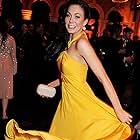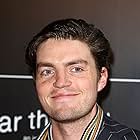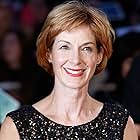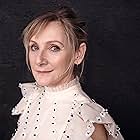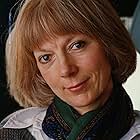The Clocks
- Episode aired Jun 26, 2011
- Not Rated
- 1h 29m
Four clocks surround an unidentified corpse in a blind woman's house, and a young typist is summoned to the crime scene. However, Poirot is convinced that the complicated setup is merely hid... Read allFour clocks surround an unidentified corpse in a blind woman's house, and a young typist is summoned to the crime scene. However, Poirot is convinced that the complicated setup is merely hiding a simpler solution.Four clocks surround an unidentified corpse in a blind woman's house, and a young typist is summoned to the crime scene. However, Poirot is convinced that the complicated setup is merely hiding a simpler solution.
- Director
- Writers
- Stars
- Nora Brent
- (as Sinead Keenan)
- Director
- Writers
- All cast & crew
- Production, box office & more at IMDbPro
Featured reviews
Interesting, intriguing story with some great twists and red herrings. Has the usual murder mystery element but adds a military and espionage angle, which makes things more interesting.
Not perfect though. The best Poirots are the ones where you have enough information to work out the murderer yourself, if you think hard enough. This is one of those where you don't know enough - the backstory that informs the plot is hidden until the very end. Still quite interesting though.
THE CLOCKS is a murder novel with a subplot about spies from an Iron Curtain country, and perhaps from the USSR itself (Nazi Germany's erstwhile ally).
Setting the episode on the eve of World War II meant the spies could be Nazi sympathizers (the writers wrongly, as usual, assuming anyone who didn't want a second German war was a Nazi sympathizer). THE CLOCKS also had a plot hole one could drive a train through, and depended too heavily on coincidence. In this adaptation the coincidences are ironed out though the plot hole is not altogether sealed.
As with Jeremy Brett's "Sherlock Holmes"; Peter Davison's "Campion"; and Joan Hickson's "Miss Marple" stories, "Poirot" started out with a big budget and good intentions, to faithfully reproduce Agatha Christie's Poirot stories for a society too lazy to open a book. Well, mostly faithful.
Naturally, "Poirot" always had to be tweaked in the change from one medium to another. Unfortunately, as the series moved from short stories into novels, it often made unnecessary story changes by writers who had little trust in the old woman behind the novels.
Some longer adaptations got it right. "Peril at End House" from the early days did an admirable job; while it's one of my favorite Christie books it is also one of my favorite "Poirot" dramatizations.
Unfortunately, as the series progressed it grew darker and even changed some of the endings, using different characters as the murderers! However, the producers of "Poirot" made one improvement over Christie. Dame Agatha's Poirot stories started in 1920 and ended in 1975, a span of 55 years where society changes but Poirot doesn't, even though he started out as a retired police detective. When his last mystery appeared he must have been more than 100! Wisely, the "Poirot" series remains set in the 1930s. "The Clocks"--originally set in 1963--is now given the more exciting setting of Dover on the verge of the second world war, with Hitler making noises across the channel.
Another improvement is this: in the original book, Poirot proves his adage that with all the facts one can find the solution without leaving one's chair. This leaves most of the foot slogging to an MI-5 agent (here, altered to be the son of Poirot's old pal Col. Race) and Poirot rarely showing any life until his final deus ex machina summation. Here, Poirot is summoned from his chair in London and has to go to Dover and interview all the people himself. A definite plus. And the local police Inspector is changed from being friendly to adversarial, a man who can't puzzle out Poirot's mysterious statements.
Apart from necessary cosmetic and plot changes, "The Clocks" is beautifully shot in a way almost reminiscent of the earlier Poirots, when he bumbled around with Hastings and Japp. Also unlike some of the later Poirots, the gratuitous swearing is reduced to one "b!tch." If there's anything more said I didn't hear it. Oh, and there's one extra-Christie, unnecessary shot of violence against a woman. Probably shoved in to show what beasts English-speaking white men are.
It even has fascinating shots that are supposed to be the secret tunnels dug beneath Dover Castle. Whether they are or not, it's still fascinating to think of those hidden labyrinth existing during the war.
It's not a perfect episode, but follows the novel's basic lines and actually improves on the original story by sticking in more Poirot.
The story is so far-fetched in concept and cluttered with such a lot of nonsense about a spy plot and the sinister group of people involved, with every facet of the story straining credibility from the start. And this, despite a fine central performance by ANNA MASSEY as a blind receptionist who finds a murdered man behind her sofa and is unable to explain either his identity or the circumstances of his death.
As usual, the production values are excellent and the acting by all concerned is on a high level of expertise. But the story seems so absurd and is hard to follow once the various details come to light, making it appear that even Poirot will be unable to unwind the tangled mess of events.
Very disappointing and certainly not one of Agatha Christie's more credible mysteries.
Lt Colin Race is investigating a spy ring when he finds a distraught young woman who has come across a stabbed man in the home of a blind lady, a home with lots of clocks showing the wrong time.
Lt Race's father was an acquaintance of Poirot and he asks for his help and Poirot comes down to Dover to investigate with Inspector Hardcastle who is a little out of his depth. The young woman worked for a company providing secretarial services. The Crescent where the dead body was found contains a host of colourful but slightly sinister characters.
It is nicely shot and for the later Poirot adaptations it contains more humour.
Did you know
- TriviaGeoffrey Palmer (Vice Admiral Hamling) was the father of the director Charlie Palmer.
- GoofsThe Police Inspector states to Poirot there'll be '....bobbies at every train station....' but the idiom is wrong for the 1930's. Up until recently in Britain (and still in use by older generations) it is a RAILWAY station.
- Quotes
Lt. Colin Race: I know she isn't involved. I know she's a good person who needs our help.
Hercule Poirot: The world is full of *good* people who do *bad* things, mon ami.
Details
- Release date
- Countries of origin
- Official sites
- Languages
- Filming locations
- Woburn Walk, Duke's Road, Bloomsbury, London, England, UK(Location of the Cavendish Secretarial Bureau)
- Production companies
- See more company credits at IMDbPro
Contribute to this page









